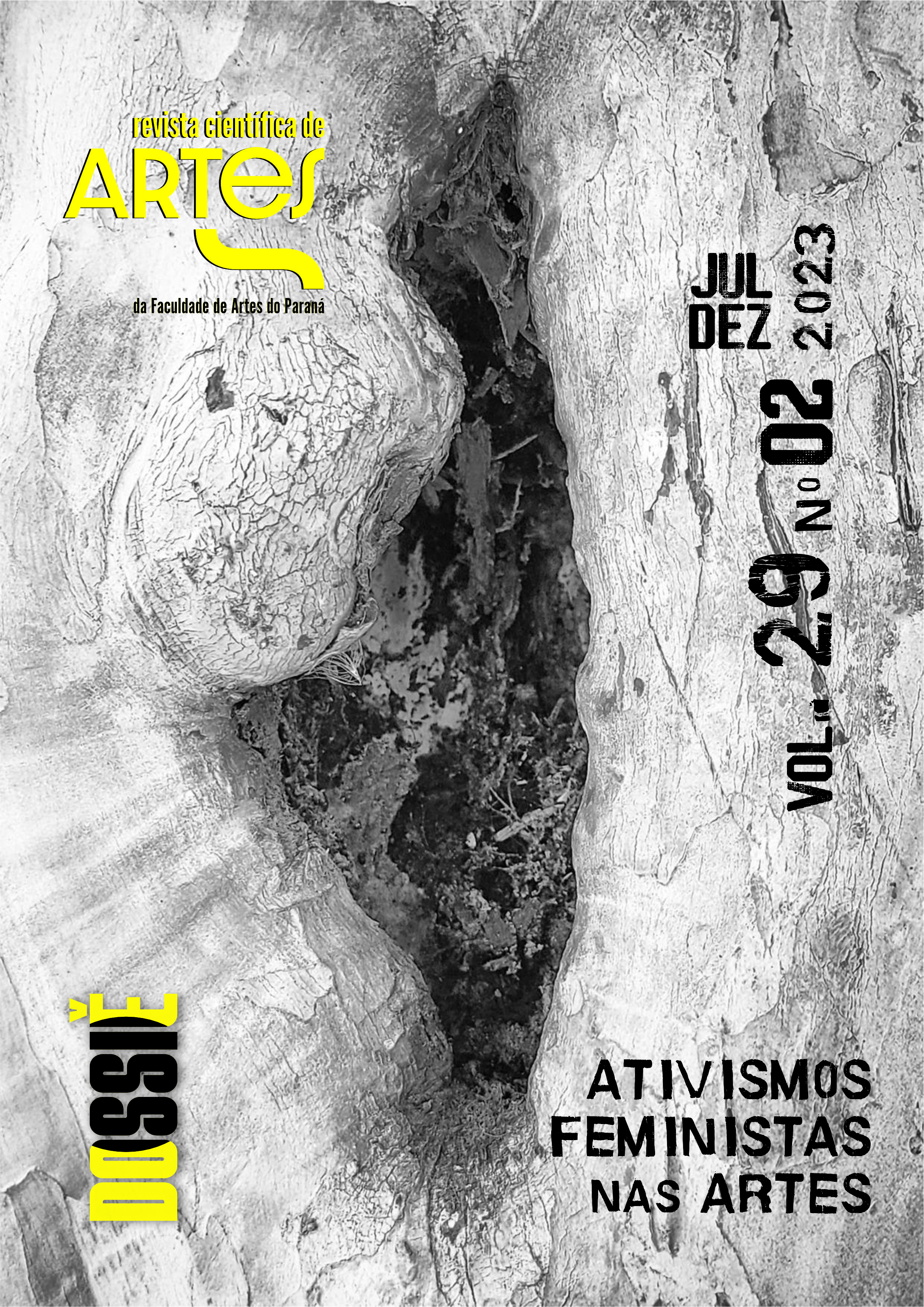A desterritorialização lésbica na visibilidade submarina de filmes brasileiros contemporâneos
DOI:
https://doi.org/10.33871/19805071.2023.29.2.8084Palabras clave:
cinema lésbico, queer, devir-mar, cinema brasileiro, desterritorializaçãoResumen
Este artigo propõe investigar como quatro curtas-metragens brasileiros realizados entre 2019 e 2021, com protagonistas/es lésbicas, produzem formas fílmicas que, tal como o mar, criam desterritórios onde não é possível estabelecer fronteiras fixas e separabilidades entre as pessoas e sua afetação no mundo e com o mundo. Um espaço onde a densidade do fundo do oceano transforma os corpos filmados em transbordamento. Os filmes em questão são Quebramar (2019), de Cris Lyra; Bege euforia (2021), de Anália Alencar; A felicidade delas (2019), de Carol Rodrigues e Uma paciência selvagem me trouxe até aqui (2021), de Érica Sarmet. Juntos, eles testemunham um cinema brasileiro lésbico contemporâneo que não apenas desafia noções pré-estabelecidas de uma imaginação cisheteronormativa do que deve ser o corpo lésbico, como tensionam o constante regime de in/visibilidade da lésbica no cinema (BRANDÃO, SOUSA, 2019) usando, com frequência, um devir-mar em suas estratégias audiovisuais.
Descargas
Citas
AKOTIRENE, Carla. Ferramenta anticolonial poderosa: os 30 anos de interseccionalidade. Disponível em: https://www.cartacapital.com.br/opiniao/ferramenta-anticolonial-poderosa-os-30-anos-de-interseccionalidade , publicado em 2019.
ANZALDÚA, Gloria. Borderlands/La Frontera: the new mestiza. San Francisco: Aunt Lute Books, 1999.
BRUNO, Giuliana. Atlas of emotion. Nova York: Verso, 2007.
BRANDÃO, Alessandra Soares; SOUSA Ramayana Lira de. “A in/visibilidade lésbica no cinema”. In: Holanda, Karla. (org.). Mulheres de cinema. Rio de Janeiro: Numa, 2019.
BRANDÃO, Alessandra Soares; SOUSA Ramayana Lira de. Bodylands para além da in/visibilidade lésbica no cinema: brincando com água. Rebeca, v. 9, p. 98-118, 2021a.
BRANDÃO, Alessandra Soares; SOUSA Ramayana Lira de. Corpas-enqueerzilhadas e alianças insólitas no cinema brasileiro. Revista Visuais, v. 7, p. 51-71, 2021b.
BRASILEIRO, Castiel Vitorino. Eclipse. Organização NY: Center for Curatorial Studies, Bard. College, 2021.
DELEUZE, Gilles; GUATARRI, Félix. Mil platôs, volume 5, trad. de Peter Pál Pelbart e Janice Caiafa. São Paulo: Editora 34, 2012.
ENES, Eliene Nery Santana; BICALHO, Maria Gabriela Parenti. Desterritorialização/reterritorialização: processos vivenciados por professoras de uma escola de Educação Especial no contexto da educação inclusiva. Educação em revista (UFMG. Impresso), v. 30, p. 189-214, 2014.
FREITAS, Kênia. “PretEspaço: as cidades não imaginadas”. In: Multiplot!. Publicado em 17 de novembro de 2020.
GALINDO, Maria; MORAES, Alana; PATRÍCIO, Mariana; ROQUE, Tatiana. La homogeneidad del feminismo nos aburre, necesitamos crear alianzas insólitas. Revista Sur, v. 13, n. 24, p. 225-235, 2016.
GLISSANT, Édouard. Poetics of relation. Ann Arbor: The University of Michigan Press, 2010.
MARTINS, Leda Maria. Performances do tempo espiralar. In: RAVETTI, Graciela; ARBEX, Márcia (org.) Performance, exílio, fronteiras: errâncias territoriais e textuais. Belo Horizonte: Departamento de Letras Românicas, Faculdade de Letras, Poslit, 2002.
MOMBAÇA, Jota; MATIUZZI, Musa Michelle. Carta à leitora preta do fim dos tempos. In: SILVA, Denise Ferreira da. A dívida impagável. São Paulo: Casa do Povo, 2019.
OLIVEIRA JR. Luiz Carlos. A mise-en-scène no cinema. Campinas: Editora Papirus, 2013.
SILVA, Denise Ferreira da. Sobre diferença sem separabilidade. 32ª Bienal de São Paulo: Incerteza Viva: Catálogo / Organizado por Jochen Volz e Júlia Rebouças. São Paulo: Fundação Bienal de São Paulo, 2016.
WITTIG, Monique. O pensamento hétero e outros ensaios. Belo Horizonte: Autêntica, 2022.
WOOLF, Virginia. Um teto todo seu. São Paulo: Tordesilhas, 2014.
Descargas
Publicado
Cómo citar
Número
Sección
Licencia
Os autores detém os direitos autorais, ao licenciar sua produção na RevistaCientífica/FAP, que está licenciada sob uma licença Creative Commons. Ao enviar o artigo, e mediante o aceite, o autor cede seus direitos autorais para a publicação na referida revista.
Os leitores podem transferir, imprimir e utilizar os artigos publicados na revista, desde que haja sempre menção explícita ao(s) autor (es) e à Revista Científica/FAP não sendo permitida qualquer alteração no trabalho original. Ao submeter um artigo à Revista Científica/FAP e após seu aceite para publicação os autores permitem, sem remuneração, passar os seguintes direitos à Revista: os direitos de primeira edição e a autorização para que a equipe editorial repasse, conforme seu julgamento, esse artigo e seus metadados aos serviços de indexação e referência.


